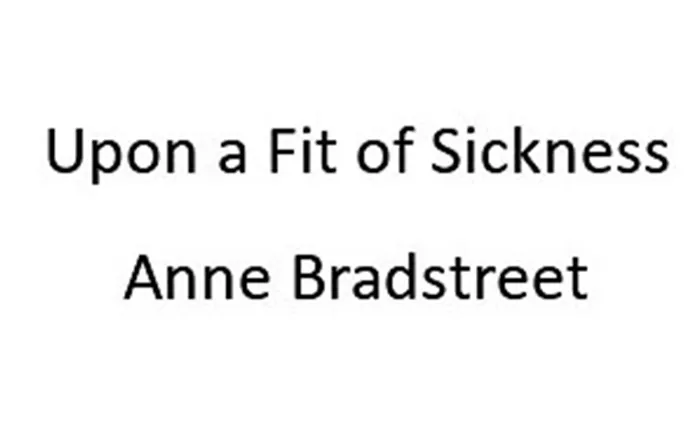Welcome to Poem of the Day – Upon a Fit of Sickness by Anne Bradstreet.
Anne Bradstreet, often hailed as America’s first poet, is known for her introspective and deeply personal works. Among her many notable poems, Upon a Fit of Sickness stands out for its candid reflection on mortality, faith, and human frailty. This article delves into the meaning, themes, and significance of this poem, offering readers a clear understanding of Bradstreet’s timeless work.
Upon a Fit of Sickness Explanation
Introduction to the Poem
Upon a Fit of Sickness was written during a time when illness and death were constant presences in daily life. Bradstreet uses her personal experience of sickness as a lens to explore broader spiritual and existential questions. The poem expresses her vulnerability and, ultimately, her reliance on divine grace. It is a testament to her Puritan faith and her poetic mastery.
Summary of the Poem
The poem begins with Bradstreet addressing her physical weakness brought on by sickness. She vividly describes the physical toll it takes, highlighting the fragility of the human body. This experience leads her to reflect on the fleeting nature of life and the certainty of death.
In the latter part of the poem, Bradstreet turns her thoughts to God, seeking comfort and guidance. She recognizes her spiritual shortcomings and asks for strength to prepare for her inevitable death. The poem ends on a note of acceptance, with Bradstreet placing her trust in God’s will.
Themes in the Poem
Mortality: Bradstreet confronts the reality of death head-on. Her illness serves as a reminder that life is temporary and that every human being must face mortality.
Human Frailty: The poet emphasizes the weakness of the human body, contrasting it with the enduring nature of the soul. This reflects Puritan beliefs about the importance of spiritual over physical well-being.
Faith and Redemption: A central theme in the poem is Bradstreet’s faith in God. She acknowledges her sins and seeks redemption, demonstrating the Puritan value of self-examination and reliance on divine grace.
Acceptance: Despite her fears, Bradstreet ultimately accepts her fate. This acceptance reflects her deep religious conviction and the comfort she finds in the promise of eternal life.
Analysis of Key Lines
“O Bubble blast, how long can’st last?”
Here, Bradstreet compares human life to a bubble, highlighting its fragility and impermanence. The image is vivid and captures the fleeting nature of existence.
“My soul, thy name, O Lord, does bless.”
This line shifts the focus from physical suffering to spiritual gratitude. It demonstrates Bradstreet’s faith and her effort to find solace in God’s mercy.
“Cheer up thy spirit with this thought:”
Bradstreet encourages herself to find comfort in the idea of eternal life. This marks a turning point in the poem, where fear gives way to hope.
Structure and Style
The poem is written in rhyming couplets, a common style in Bradstreet’s era. The steady rhythm mirrors the contemplative tone of the poem, while the rhyme scheme gives it a lyrical quality. The language is straightforward yet rich in metaphor, making her reflections relatable and deeply moving.
Relevance Today
Anne Bradstreet’s Upon a Fit of Sickness remains relevant in its exploration of universal themes like illness, mortality, and faith. In a modern context, the poem resonates with those seeking meaning and comfort in the face of life’s challenges. It serves as a reminder of the enduring power of faith and the human spirit’s resilience.
Conclusion
Upon a Fit of Sickness is a poignant reflection on the trials of human existence and the hope of divine grace. Anne Bradstreet’s ability to transform personal struggles into profound poetic expressions is what makes her work timeless. Through this poem, she invites readers to confront their own mortality, embrace their faith, and find peace in the inevitability of life’s end.

